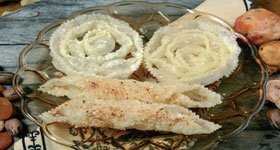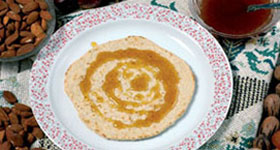A true treasure of health and power
- In the Egyptian Papyruses, 3500 years ago, honey is mentioned as a healing treatment.
- In the book of life of the ancient Indians is referred that honey and milk prolong life when they are used in the daily nutrition.
- Nectar was the food of the immortal gods in Olympus. Zeus was brought up with honey from the nymph Bee.
 Hippocrates recommended honey for the healing of many diseases and so did Aristotle who believed that honey prolonged life.
Hippocrates recommended honey for the healing of many diseases and so did Aristotle who believed that honey prolonged life.- The Egyptians offered honeycombs to gods as a precious gift of loyalty and consoling.
Why honey and not sugar
There exist many books about honey, that praise this wonderful natural product.There was never something written against honey. On the contrary, sugar has been accused of causing many side effects in the human’s health. The high cholesterol level, headaches, tiredness, irritabilities, constipation and many more are attributed basically to the common sugar.
Sugar is an industrialized and of chemical elaboration product.
Honey is a natural biological product, directly from nature and allows of no elaboration.
Honey contains of 180 different substances, which are organically connected in such way that no one has ever accomplished its production with technical ways, although it’s well known consistence.
Nutrition value of honey
-
The honey sugars are simple, immediately absorbed and that is why honey is a fast energy source for our health system, for athletes, children, pregnant women, sick people or any feeble organism.
-
Honey has inorganic elements known as minerals, which help a lot the metabolism and the nutrition as elements needed in bones and cells, and also contribute in many enzyme systems and, finally, adjust the stomach acidity. The concentration of the honey vitamins isn’t enough for our daily needs, but help in the absorption of the sugars.
-
Honey has antiseptic characteristics, is toning, increases the heart beat function, reduces ulcer trouble in the stomach and generally and contributes in general in the good function of the human body.
-
Honey consumption helps in the quicker rehabilitation of health due to anemia, because of the ferrum that it consists.
-
Honey helps significantly in the quicker metabolism of alcohol and in that way it absolves from the condition of drunkenness.
-
Honey has high conciseness in choline which helps people that do sedentary work suffer from constipation.
-
Honey has antimicrobial acting against the growth of bacteria and other pathogenic micro organisms. Also useful for the healing, cleaning and disinfection of wounds.
Types of honey
There are two main honey categories. The flower honey, that is produced by the nectar of the flowers and the honey that is produced by the juices of pine, fir and other plants of the woods. The flower honey according to same other special features is named after the plant from which it comes from. So we have the  varieties of Thyme Honey, Orange Tree Honey, Sunflower Honey, Briar Honey, Chestnut Honey, Cotton Honey, Polikombos Honey etc. The same thing happens with the honey produced by wood plants with main varieties of Pine Honey and Fri Honey.
varieties of Thyme Honey, Orange Tree Honey, Sunflower Honey, Briar Honey, Chestnut Honey, Cotton Honey, Polikombos Honey etc. The same thing happens with the honey produced by wood plants with main varieties of Pine Honey and Fri Honey.
 varieties of Thyme Honey, Orange Tree Honey, Sunflower Honey, Briar Honey, Chestnut Honey, Cotton Honey, Polikombos Honey etc. The same thing happens with the honey produced by wood plants with main varieties of Pine Honey and Fri Honey.
varieties of Thyme Honey, Orange Tree Honey, Sunflower Honey, Briar Honey, Chestnut Honey, Cotton Honey, Polikombos Honey etc. The same thing happens with the honey produced by wood plants with main varieties of Pine Honey and Fri Honey.Every variety has certain particularities that distinguish it from the others:
-
Thyme Honey: strongly aromatic, extremely pleasant in taste with clear shiny light-colored look, enlisted in the top quality honey varieties. Crystallizes in 6 to 18 months after its production.
-
Orange Tree Honey: with a wonderful aroma and an excellent taste. Crystallizes very soon, from one to two months after its production. It is very light-colored and turns white-like after its crystallization.
-
Pine Tree Honey: consists of the 65% of the total honey production in Greece. It isn’t particularly sweet, richer that flower honey in minerals and proteins and has low calories. It’s from the honey varieties that doesn’t crystallize.
Honey Crystallization and quality
-
Crystallization is a natural phenomenon that causes absolutely no change in the nutrition value and the biological substance of honey. It is related to the phytogenic orientation of honey and is affected by its chemical composition. The factors that are important in the honey’s crystallization are the concentration of the amounts in glucose and water, the analogy of fructose and glucose, the mixture’s content in pollen grain and the presence of the sacchar of melitose etc.
-
A crystallized amount of honey is neither expired nor adulterated. The crystallized honey can be easily fluidized in a ben mari without missing any of the biological or nutritional quality.
The color of honey
The color of honey is a characteristic of its orientation. The dark-colored honey is rich in micronutrients (potassium, magnesium, phosphor, iron, sodium etc) and has greater nutrition value. The light-colored honey has better aroma and taste.
Honey and Adulteration
Honey is one of the very little foods that can’t be adulterated. It mixed difficult with water, glucose or other sweetening substances. Occasions of adulteration in the Greek honey are very rare.
Greek and not foreign
Greek honey is by quality the best in comparison to the imported for the following reasons:
- imported honey is more water-like, that is has higher lever of humidity. The higher the humidity level is, the more likely it is for the honey to turn sour.
- the imported honey is sold at a very low price (200 – 300 drc per kilo) when imported but in a very high price when resold (1000 to 1500 drc per kilo), and as a result some over speculate against the Greek consumer.
- honey’s production technology isn’t particularly developed in Greece and as a result honey has the minimum elaboration and standardization. On the contrary, imported honey is a formalized product of maximum elaboration (overheated, mixed to prevent crystallization, color changed etc).
- the taste of Greek honey is superior to that of the imported.
Honey Packaging
The glass package is preferred because glass is a neutral material and doesn’t react to honey so it doesn’t alternates the quality. Additionally, the consumer can judge the color, fluidity, clarity and crystallization.
The tin package helps in preserving the biological quality of honey as it doesn’t affect significantly the bacteriostatic act of it.
Plastic vases that don’t record the indication "for food use" are inappropriate and must be avoided.
The content of this article has been republished from the website of "Apicultural Association of Chania Cooperation".
Honey’s value has been appreciated from the ancient times:
Source: Monthly Magazine "Apiarian Review"
Text: Thrasimvoulou Andreas, Co Professor of the Laboratory of Apiarian of Aristotelio University Thessaloniki.
| < Préc | Suivant > |
|---|






